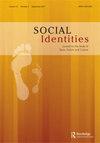The ever-diminishing liminal space of being: the totalizing subjectification of being
IF 0.7
Q3 ETHNIC STUDIES
引用次数: 0
Abstract
ABSTRACT Within this article, I make multiple interconnected arguments around the idea of the subject, the process of subjectivization, the essentializing nature of most of our research processes in academia, the socializing of existence, the loss of ‘nature,’ and the obliteration of what Homi Bhabha has so accurately described as liminal space: a space where humans may escape the socializing processes of performance and existence that is demanded in spaces that dictate social aggrandizement. Building upon Foucault’s, Butler's, and Bey's conceptions of the subject and the processes of subjectivization, I will argue, coming from a postanarchist vantage, that the social’s machinations of subjection and subjectivization have undergone various kinds of evolutions throughout the later part of the twentieth century and even more in the last twenty years. For instance, using Homi Bhabha’s theorization of liminal space, I will then point to the ever-decreasing liminal spaces that humanity has to be human with each other outside of the social and scientific realm of study, policy, and existence as such. Ultimately, I will argue that modern all-pervasive systems of identification, particularly those found within realms of liberalistic research (while providing a commendable service in aiding our experiences within the social apparatuses around us – explicating them in various ways) continue/support the functioning of such social apparatuses that they may superficially want to tear down but unintentionally and from a place of power and influence continue the subjectivization of entire populations/groups/figments/folks/communities within tightly controlled spaces of reality always already defined as the social.存在的不断缩小的有限空间:存在的总体主体化
摘要在这篇文章中,我围绕主题的概念、主观主义的过程、我们在学术界大多数研究过程的本质化性质、存在的社会化、“自然”的丧失、,Homi Bhabha如此准确地描述为极限空间的东西被抹去了:在这个空间里,人类可以逃离表现和存在的社会化过程,而这正是决定社会膨胀的空间所要求的。在福柯、巴特勒和贝关于主体和主观主义过程的概念的基础上,我将从后无政府主义的角度出发,认为社会的主观主义和主观论的阴谋在整个20世纪后半叶,甚至在过去20年中经历了各种演变。例如,利用Homi Bhabha对极限空间的理论,我将指出不断减少的极限空间,即人类必须在研究、政策和存在的社会和科学领域之外相互成为人。最终,我认为现代无处不在的身份识别系统,特别是那些在自由主义研究领域中发现的人(同时提供了一种值得称赞的服务,帮助我们在周围的社会机构中体验——以各种方式解释它们)继续/支持这些社会机构的运作,他们表面上可能想拆除,但无意中,从一个权力和影响力的地方继续在严格控制的现实空间中,整个人口/群体/人物/人群/社区的主观化总是被定义为社会性的。
本文章由计算机程序翻译,如有差异,请以英文原文为准。
求助全文
约1分钟内获得全文
求助全文
来源期刊

Social Identities
ETHNIC STUDIES-
CiteScore
2.00
自引率
0.00%
发文量
22
期刊介绍:
Recent years have witnessed considerable worldwide changes concerning social identities such as race, nation and ethnicity, as well as the emergence of new forms of racism and nationalism as discriminatory exclusions. Social Identities aims to furnish an interdisciplinary and international focal point for theorizing issues at the interface of social identities. The journal is especially concerned to address these issues in the context of the transforming political economies and cultures of postmodern and postcolonial conditions. Social Identities is intended as a forum for contesting ideas and debates concerning the formations of, and transformations in, socially significant identities, their attendant forms of material exclusion and power.
 求助内容:
求助内容: 应助结果提醒方式:
应助结果提醒方式:


